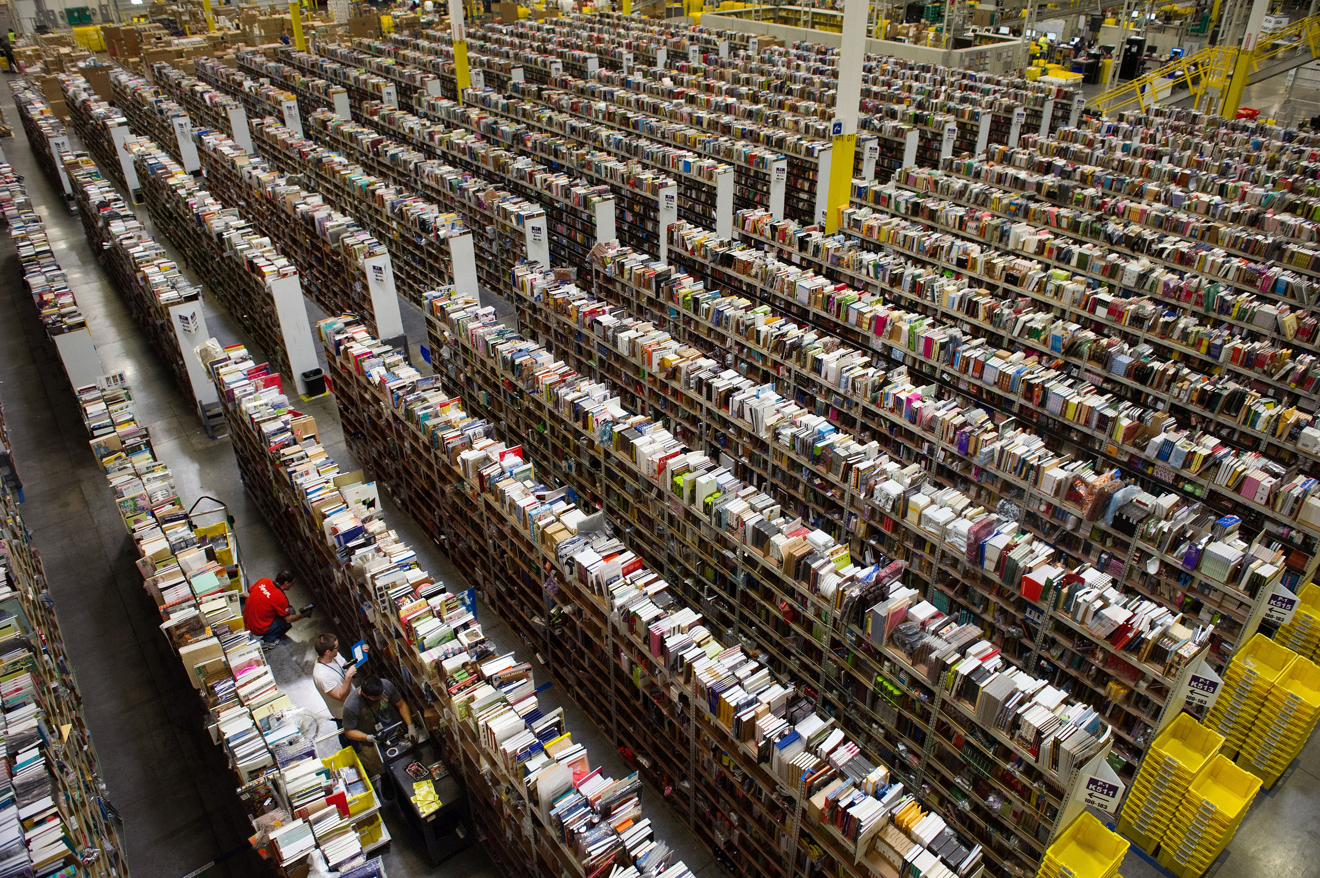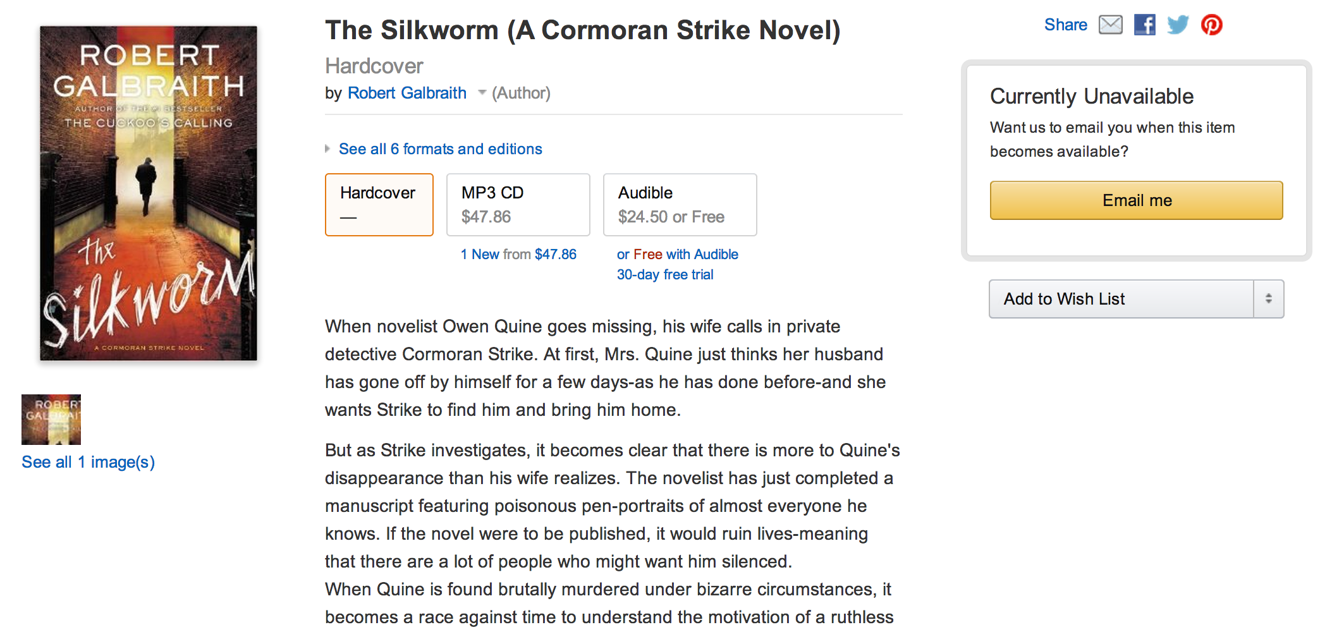After blocking preorders and delaying shipments for titles in the midst of ongoing negotiations with publisher Hachette, Amazon has now spoken out on the dispute, attempting to portray its decisions as advantageous to customers, while also admitting that the issues are not likely to be solved soon.
"When we negotiate with suppliers, we are doing so on behalf of customers," Amazon's books team said in a statement posted to the mega-retailer's website. "Negotiating for acceptable terms is an essential business practice that is critical to keeping service and value high for customers in the medium and long term."
The company was compelled to comment on the dispute with Hachette after generally negative publicity focused on Amazon began to swell last week, when it was highlighted that the market dominating bookseller had begun refusing preorders for several upcoming Hachette titles including "The Silkworm" by J.K. Rowling, written under the pseudonym Robert Galbraith. Hachette is one of the "Big Five" book publishers, and industry watchers believe Amazon's moves are intended to frustrate writers, hoping they will pressure publishers to give a more favorable — and profitable — contract to Amazon.
In its statement, Amazon reminded customers that Hachette is a major corporation too, saying it's "part of a $10 billion media conglomerate." The retailer suggested that the media's interest in the story is driven by the fact that Amazon's negotiations are "with a book publisher instead of a supplier of a different type of product."
Amazon did admit it is carrying less print editions and "safety stock" titles from Hachette, and is also not accepting preorders for the publisher's upcoming books. The company explained that it is its "right" to "determine whether the terms on an offer are acceptable and to stock items accordingly."
The online retailer didn't say exactly how many Hachette titles and products are affected, but characterized the dispute as affecting a "small percentage" of Amazon's total offerings. Amazon said that if a user were to order 1,000 items from the company, 989 would be unaffected by the interruption.
"If you do need one of the affected titles quickly, we regret the inconvenience and encourage you to purchase a new or used version from one of our third-party sellers or from one of our competitors," Amazon said.
The Amazon-Hachette dispute has been under particular scrutiny as Amazon dominates the e-book market while competitors such as Apple are looking to gain ground. Apple suffered a serious setback last year, however, when it was successfully sued by the U.S. government for conspiring with book publishers to raise e-book prices.
Apple led the charge in convincing publishers to switch to a so-called "agency" pricing model. That prevented content owners from being able to sell the same titles at a lower price elsewhere, without offering the same price on Apple's iBooks platform — a "most favored nations" clause.
In contrast, the e-book industry prior to the launch of the first iPad was under the "wholesale model" preferred by Amazon. In that model, resellers such as Amazon had the power to set prices, selling titles at or below cost if they chose to do so.
As Apple attempts to compete with Amazon, the iPad maker is now saddled with an injunction that bars it from entering into any unsavory deals with publishers such as Hachette.
Apple has formally appealed the antitrust ruling, asking for either a dismissal of the verdict or a complete retrial. Apple continues to believe that the iBookstore and iPad created competition in the e-book space, where Amazon's Kindle platform controlled some 90 percent of the market as of 2009.
 Neil Hughes
Neil Hughes








-m.jpg)






 Andrew Orr
Andrew Orr
 Amber Neely
Amber Neely
 Marko Zivkovic
Marko Zivkovic
 William Gallagher and Mike Wuerthele
William Gallagher and Mike Wuerthele



 Mike Wuerthele
Mike Wuerthele









45 Comments
The true test of character is not how you act when you are the little guy, but how you act when you have all the money & power. Now that Amazon.com is the only game left in town, they have shown that they intend to use their power for evil instead of good. The U.S. Department of Justice was supposed to protect us against anti-competitive monopolies like Amazon, but instead, they decided to shut down any businesses who tried to compete against Amazon. And now, this is what has happened.
I'm pretty sure Amazon is negotiating on behalf of its de-facto monopoly, not the customers.
Amazon makes squat for margins. Their choices are to either raise prices somewhat, or get better deals from their suppliers. They are trying the supplier route first. If the suppliers are at the breaking point and won't budge on some of the titles- with Amazon out of the picture, other stores like Play and iBooks should be free to sell those books at a higher price.
Or Amazon could just tell the publishers they will raise prices on all their books by 30%, as long as the system effectively prevents anyone else from undercutting them. Could be a big win for publishers and Amazon.
This is absurd, Hatchette might be part of a conglomerate but each segment of that conglomerate has its own bottom line. It is clear Amazon has FAR too much power in the publishing industry. U.S. should have prosecuted Amazon for its anti-competitive measures, not Apple. Apple was trying to make the overall market more competitive by putting a floor on prices so businesses, like Amazon, could not gobble up market share at the cost of short term profits only to use that market share down the road to increase profits. This is what we are seeing right now. Amazon is feeling big and powerful and shareholders are wanting to see higher margins. How does Amazon respond? Strong-arming one of its publishing partners (The smallest of the big 5, I might add, therefore easiest precedent setting entity). This has all happened before and it will all happen again - Windows and the OS Dark Ages of the 80's-90's.
>Amazon makes squat for margins. Their choices are to either raise prices somewhat, or get better deals from their suppliers. Amazon's margins are fine, their profits are slim because they funnel extreme amounts of capital into lobbying and marketing activities that undercut new competitors, effectively driving them out of business to ensure that they're the only store in town. The end effect is less competition, less choice of titles and no you don't get cheaper books in the long run, because everything else goes up as a result. Screwing down vendors is only for two things: to help fund their undercutting practices, or provide more shareholder value. It's not for consumers.